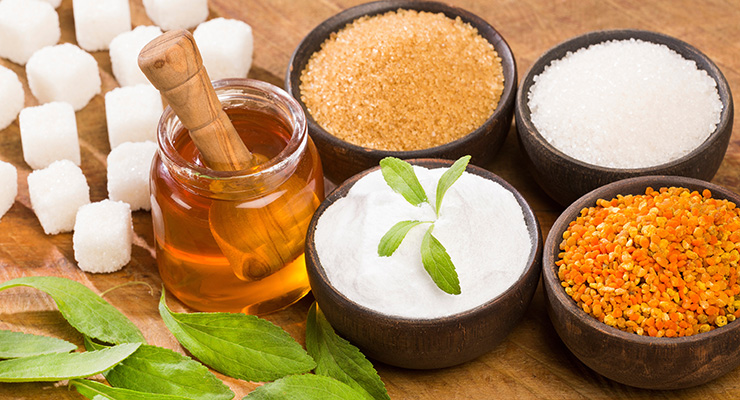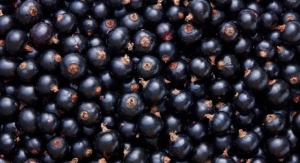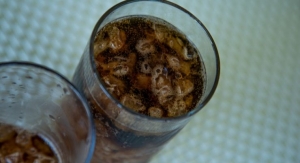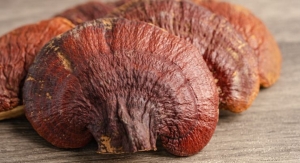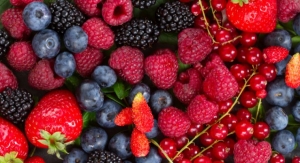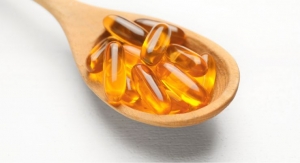By Sean Moloughney, Editor04.06.23
Reducing sugar is the number one dietary priority for consumers in the U.S., according to Julie Johnson, president of HealthFocus International. Overall, about half (45%) of Americans are concerned about sugar, which is slightly less than concern about artificial sweeteners (48%), according to HealthFocus’ 2022 data.
“When thinking about sweeteners, consumers still gravitate towards natural over artificial. Good taste is still a base level requirement in all products,” said Johnson. “Not only are consumers more concerned about artificial sweeteners (than sugar), but there are taste barriers for artificial sweeteners as well.”
As with most ingredients, “naturalness” is about perception in sweeteners, Johnson added, though negativity around specific artificial sweeteners has actually dropped compared to 2020. For example, 56% of U.S. consumers rated aspartame/Equal as “bad” in 2020, compared to 45% in 2022.
“Unless a consumer is looking to fulfill specific dietary requirements (keto, diabetic, etc.), or is specifically looking for an all-natural product, it’s all about taste for consumers,” Johnson said. “If the taste and flavor profile fit the product, then consumers will be more accepting of that product regardless of the sweetener used.”
Products made with stevia now account for $4.6 billion in annual sales, which have grown at 14% CAGR (2018-22), according to Nielsen data from December 2022.
“That’s a pace that outperforms category growth by 3-5 times,” said Saunders, “and shows no signs of slowing. Clearly, there’s an appetite for reduced-sugar products, and it’s our job as an industry to meet those needs.”
Recognizing a healthy appetite for reduced-sugar products, brands are making progress, Saunders suggested. “Improved ingredient technology is central to their innovation efforts, enabling deeper reductions in sugar, creating products with better taste, and delivering sugar reduction across a broader range of applications.”
Cargill’s newest sweetening system, EverSweet stevia sweetener + ClearFlo natural flavor is a good example, she added. “It’s a game-changer for stevia, enabling brands to use the zero-calorie sweetener in applications where it previously wasn’t possible and achieve much deeper reductions in sugar, including all the way to no-sugar-added.”
There’s still a place for full-sugar options. “Consumers want choices,” Saunders said, “and that’s why it’s critical for brands and ingredient suppliers to stay consumer-centric, keeping their needs and expectations at the forefront of every product innovation journey. Our deep ingredient toolbox includes a full portfolio of sweeteners so that our customers have access to whatever their formulation needs may be.”
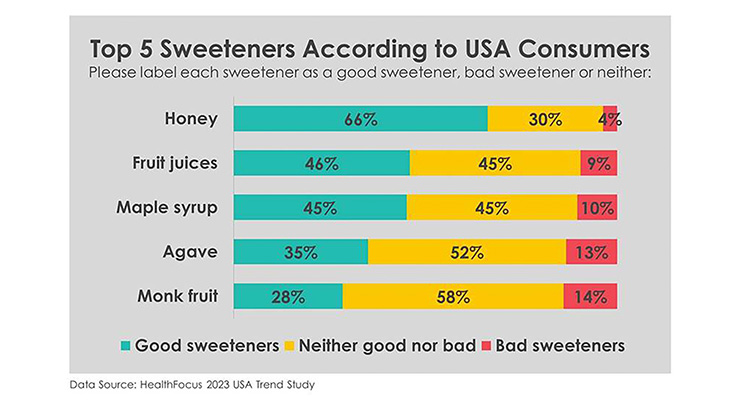
Natural sweeteners have gained in popularity as consumers continue to move away from artificial sweeteners. “However, while consumers may avoid artificial sweeteners, they still expect reduced-sugar foods and beverages that taste great. That’s why zero-calorie sweeteners like stevia continue to make significant gains. Dramatic improvements in next-generation stevia products, combined with consumers’ greater familiarity with the ingredient, have opened the door to a new wave of reduced-sugar formulations.”
Cargill’s latest proprietary sweetener claim research, conducted in 2022, offers additional insight into how consumers view sugar, sweeteners, and related claims.
Americans are more likely to check the amount of sugar than to look for a specific sweetener or claim. However, sweetener claims can influence purchases. “Those that fared best in our survey typically implied ‘natural’ or ‘no artificial sweeteners,’ including ‘naturally sweetened,’ or made with a natural sweetener,’” said Saunders.
While the importance of sugar content and the popularity of label-friendly terminology showed widespread appeal, Cargill’s research also looked at consumer attitudes toward sugar/calorie-related claims. Responses suggested that consumers were open to products with some sugar in the formula, as claims like “no added sugar” and “low sugar” typically delivered higher net purchase-impact scores as compared to “0 grams total sugar,” “no sugar,” and “sugar free.”
With a range of sweetener options in today’s market, there appear to be significant opportunities to influence consumer perception. For example, according to HealthFocus data, 58% of U.S. consumers view monk fruit as neither good nor bad, while 28% view it as good, and 14% label it as bad. Meanwhile, half of consumers are neutral about stevia, while 27% view it as good and 23% consider it bad.
When it comes to sugar alcohols, consumers often perceive them as neutral, or negatively, “because the names sound very artificial,” said Johnson.
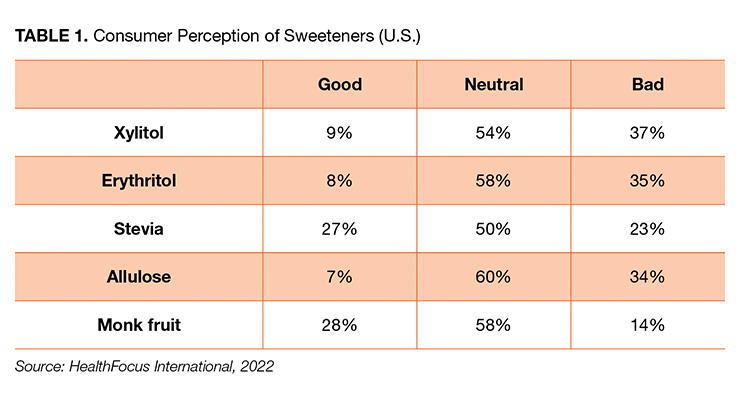
Researchers from the Cleveland Clinic examined potential links between circulating levels of plasma components from the diet and atherothrombotic disease risk in at-risk individuals. The findings suggested that varying levels of erythritol as well as other components found in the plasma were associated with increased risk of cardiovascular events and that erythritol could contribute to blood clots in rodent and in vitro studies.
Authors noted the need for “further safety studies examining the long-term effects of artificial sweeteners in general, and erythritol specifically, on risks for heart attack and stroke, particularly in patients at higher risk.”
“Sweeteners like erythritol have rapidly increased in popularity in recent years but there needs to be more in-depth research into their long-term effects,” Stanley Hazen, MD, PhD, chairman for the Department of Cardiovascular and Metabolic Sciences in Lerner Research Institute and co-section head of preventive cardiology at Cleveland Clinic, said in a statement. “Cardiovascular disease builds over time, and heart disease is the leading cause of death globally. We need to make sure the foods we eat aren’t hidden contributors.”
He continued to state that erythritol is a “proven safe and effective choice for sugar and calorie reduction and, for more than 30 years, has been used in reduced-sugar foods and beverages to provide sweetness, as well as enhance their taste and texture.”
Dr. Keri Peterson, MD, medical advisor to the Calorie Control Council added: “This study had several limitations that challenge its credibility. The stated findings were only an association and do not imply causation. Additionally, the study did not control for risk factors that contribute to heart attack and stroke. Their study population was made up predominantly of subjects who already had underlying risk factors including atherosclerosis, hypertension, diabetes and being male over the age of 60. This is an inherent bias towards developing cardiovascular events and cannot be applied to the general population.”
Thom King, CEO of Icon Foods, which helps food companies deliver innovative, naturally sweetened products, said he was disappointed but not surprised by the media attention the Nature Medicine study received.
“If there are 200 studies that say something is safe and one study that says that same something will harm you, we all know which study will find its way into the news. It’s important to note that the study assigned a correlation, but no causation, and a speculative mechanism, resulting in the thought ‘Studies assessing the long-term safety of erythritol are warranted.’ From what I observed as a food scientist, the study ignored that properly designed double-blind crossover clinical studies have already been completed, published, reviewed, and found no such correlation for consumption and negative health outcomes.”
Erythritol has been safely used for 30 years, King said, noting the study referred to endogenous erythritol, not dietary erythritol. “Our bodies naturally produce erythritol and if you have suffered a cardiac event or you have metabolic disease, your body will produce more erythritol. I believe this study was critically flawed. In the 25 years I have been in business selling erythritol, we have never heard nor experienced a return of product complaint or lawsuit regarding the safety or bad effects of erythritol. Icon Foods firmly stands by the safety of erythritol. We will continue to be the leading supplier of erythritol in North America.”
Looking more broadly, King said the sugar industry and large CPG companies “have been under attack.”
“This started when the FDA proposed a new definition for the term ‘healthy,’ which has been creating a huge divide between big food makers and nutritionists. The new guidelines put a limit on added sugars in order for a product to be called healthy. The upper limit is 5% or 2.5 grams of added sugar. To put this in perspective, one can of Pepsi has 39 grams of sugar and a Snickers bar has 20 grams.”
He also took issue with the idea that erythritol is an “artificial sweetener.” “It occurs naturally in our bodies and it naturally occurs in nature. Erythritol is a product of fermentation whereby a glucose or starch substrate is treated with a bacteria. The bacteria consumes the starch or glucose and the resulting metabolite is erythritol.”
Allulose is not metabolized in the human body, and therefore has no impact on blood sugar. In formulations it acts very much like sugar, King said, “although it is only 70% as sweet as sugar and burns at a lower temperature. Allulose is a great option for formulators looking to formulate out erythritol.” However, despite FDA GRAS approval, “Whole Foods Market doesn’t accept products with allulose right now,” he added.
On product labels, allulose counts toward carbohydrates, but not added sugars since it has fewer calories, produces only negligible increases in blood glucose or insulin levels, and does not promote dental decay.
“Additionally, allulose is not metabolized as a sugar,” King said, “70% of it is absorbed in the small intestine with some fermentation from the intestinal bacteria; 30% of it is excreted in the feces.”
“When thinking about sweeteners, consumers still gravitate towards natural over artificial. Good taste is still a base level requirement in all products,” said Johnson. “Not only are consumers more concerned about artificial sweeteners (than sugar), but there are taste barriers for artificial sweeteners as well.”
As with most ingredients, “naturalness” is about perception in sweeteners, Johnson added, though negativity around specific artificial sweeteners has actually dropped compared to 2020. For example, 56% of U.S. consumers rated aspartame/Equal as “bad” in 2020, compared to 45% in 2022.
“Unless a consumer is looking to fulfill specific dietary requirements (keto, diabetic, etc.), or is specifically looking for an all-natural product, it’s all about taste for consumers,” Johnson said. “If the taste and flavor profile fit the product, then consumers will be more accepting of that product regardless of the sweetener used.”
A Toolbox Approach
Consumers are checking product labels, “with a keen eye toward total and added sugar levels,” said Carla Saunders, senior marketing manager for high intensity sweeteners, Cargill. “They’re also following through with action, putting reduced-sugar products in their shopping carts.”Products made with stevia now account for $4.6 billion in annual sales, which have grown at 14% CAGR (2018-22), according to Nielsen data from December 2022.
“That’s a pace that outperforms category growth by 3-5 times,” said Saunders, “and shows no signs of slowing. Clearly, there’s an appetite for reduced-sugar products, and it’s our job as an industry to meet those needs.”
Recognizing a healthy appetite for reduced-sugar products, brands are making progress, Saunders suggested. “Improved ingredient technology is central to their innovation efforts, enabling deeper reductions in sugar, creating products with better taste, and delivering sugar reduction across a broader range of applications.”
Cargill’s newest sweetening system, EverSweet stevia sweetener + ClearFlo natural flavor is a good example, she added. “It’s a game-changer for stevia, enabling brands to use the zero-calorie sweetener in applications where it previously wasn’t possible and achieve much deeper reductions in sugar, including all the way to no-sugar-added.”
There’s still a place for full-sugar options. “Consumers want choices,” Saunders said, “and that’s why it’s critical for brands and ingredient suppliers to stay consumer-centric, keeping their needs and expectations at the forefront of every product innovation journey. Our deep ingredient toolbox includes a full portfolio of sweeteners so that our customers have access to whatever their formulation needs may be.”

Considering Claims
Globally, almost two-thirds of consumers (63%) claimed “no artificial sweeteners” is an extremely or very important statement on food and beverage labels, according to HealthFocus data. “This desire to avoid artificial ingredients reflects broader trends around clean eating, as consumers continue to seek out products made with familiar ingredients perceived as less processed and healthier,” said Saunders.Natural sweeteners have gained in popularity as consumers continue to move away from artificial sweeteners. “However, while consumers may avoid artificial sweeteners, they still expect reduced-sugar foods and beverages that taste great. That’s why zero-calorie sweeteners like stevia continue to make significant gains. Dramatic improvements in next-generation stevia products, combined with consumers’ greater familiarity with the ingredient, have opened the door to a new wave of reduced-sugar formulations.”
Cargill’s latest proprietary sweetener claim research, conducted in 2022, offers additional insight into how consumers view sugar, sweeteners, and related claims.
Americans are more likely to check the amount of sugar than to look for a specific sweetener or claim. However, sweetener claims can influence purchases. “Those that fared best in our survey typically implied ‘natural’ or ‘no artificial sweeteners,’ including ‘naturally sweetened,’ or made with a natural sweetener,’” said Saunders.
While the importance of sugar content and the popularity of label-friendly terminology showed widespread appeal, Cargill’s research also looked at consumer attitudes toward sugar/calorie-related claims. Responses suggested that consumers were open to products with some sugar in the formula, as claims like “no added sugar” and “low sugar” typically delivered higher net purchase-impact scores as compared to “0 grams total sugar,” “no sugar,” and “sugar free.”
With a range of sweetener options in today’s market, there appear to be significant opportunities to influence consumer perception. For example, according to HealthFocus data, 58% of U.S. consumers view monk fruit as neither good nor bad, while 28% view it as good, and 14% label it as bad. Meanwhile, half of consumers are neutral about stevia, while 27% view it as good and 23% consider it bad.
When it comes to sugar alcohols, consumers often perceive them as neutral, or negatively, “because the names sound very artificial,” said Johnson.

Erythritol Takes Heat
At the end of February a study was published in Nature Medicine titled, “The Artificial Sweetener Erythritol and Cardiovascular Event Risk.” The study got the attention of mainstream media outlets.Researchers from the Cleveland Clinic examined potential links between circulating levels of plasma components from the diet and atherothrombotic disease risk in at-risk individuals. The findings suggested that varying levels of erythritol as well as other components found in the plasma were associated with increased risk of cardiovascular events and that erythritol could contribute to blood clots in rodent and in vitro studies.
Authors noted the need for “further safety studies examining the long-term effects of artificial sweeteners in general, and erythritol specifically, on risks for heart attack and stroke, particularly in patients at higher risk.”
“Sweeteners like erythritol have rapidly increased in popularity in recent years but there needs to be more in-depth research into their long-term effects,” Stanley Hazen, MD, PhD, chairman for the Department of Cardiovascular and Metabolic Sciences in Lerner Research Institute and co-section head of preventive cardiology at Cleveland Clinic, said in a statement. “Cardiovascular disease builds over time, and heart disease is the leading cause of death globally. We need to make sure the foods we eat aren’t hidden contributors.”
(Related: Podcast: Thom King on Erythritol Safety, Sugar Reduction and Formulation Strategies)
In response, to the study, Robert Rankin, executive director of the Calorie Control Council, issued a statement saying: “The results of this study are contrary to decades of scientific research showing reduced-calorie sweeteners like erythritol are safe, as evidenced by global regulatory permissions for their use in foods and beverages, and should not be extrapolated to the general population, as the participants in the intervention were already at increased risk for cardiovascular events.”He continued to state that erythritol is a “proven safe and effective choice for sugar and calorie reduction and, for more than 30 years, has been used in reduced-sugar foods and beverages to provide sweetness, as well as enhance their taste and texture.”
Dr. Keri Peterson, MD, medical advisor to the Calorie Control Council added: “This study had several limitations that challenge its credibility. The stated findings were only an association and do not imply causation. Additionally, the study did not control for risk factors that contribute to heart attack and stroke. Their study population was made up predominantly of subjects who already had underlying risk factors including atherosclerosis, hypertension, diabetes and being male over the age of 60. This is an inherent bias towards developing cardiovascular events and cannot be applied to the general population.”
Thom King, CEO of Icon Foods, which helps food companies deliver innovative, naturally sweetened products, said he was disappointed but not surprised by the media attention the Nature Medicine study received.
“If there are 200 studies that say something is safe and one study that says that same something will harm you, we all know which study will find its way into the news. It’s important to note that the study assigned a correlation, but no causation, and a speculative mechanism, resulting in the thought ‘Studies assessing the long-term safety of erythritol are warranted.’ From what I observed as a food scientist, the study ignored that properly designed double-blind crossover clinical studies have already been completed, published, reviewed, and found no such correlation for consumption and negative health outcomes.”
Erythritol has been safely used for 30 years, King said, noting the study referred to endogenous erythritol, not dietary erythritol. “Our bodies naturally produce erythritol and if you have suffered a cardiac event or you have metabolic disease, your body will produce more erythritol. I believe this study was critically flawed. In the 25 years I have been in business selling erythritol, we have never heard nor experienced a return of product complaint or lawsuit regarding the safety or bad effects of erythritol. Icon Foods firmly stands by the safety of erythritol. We will continue to be the leading supplier of erythritol in North America.”
Looking more broadly, King said the sugar industry and large CPG companies “have been under attack.”
“This started when the FDA proposed a new definition for the term ‘healthy,’ which has been creating a huge divide between big food makers and nutritionists. The new guidelines put a limit on added sugars in order for a product to be called healthy. The upper limit is 5% or 2.5 grams of added sugar. To put this in perspective, one can of Pepsi has 39 grams of sugar and a Snickers bar has 20 grams.”
He also took issue with the idea that erythritol is an “artificial sweetener.” “It occurs naturally in our bodies and it naturally occurs in nature. Erythritol is a product of fermentation whereby a glucose or starch substrate is treated with a bacteria. The bacteria consumes the starch or glucose and the resulting metabolite is erythritol.”
The Arrival of Allulose
Another trending sweetener that’s also produced through fermentation is allulose. “The only difference is the resulting metabolite is a saccharide as opposed to a polyol,” noted King. “Additionally, where erythritol is crystallized in a reactor, allulose undergoes crystallization in a super-saturated environment, or broth, with a seed crystal that sets off crystallization.”Allulose is not metabolized in the human body, and therefore has no impact on blood sugar. In formulations it acts very much like sugar, King said, “although it is only 70% as sweet as sugar and burns at a lower temperature. Allulose is a great option for formulators looking to formulate out erythritol.” However, despite FDA GRAS approval, “Whole Foods Market doesn’t accept products with allulose right now,” he added.
On product labels, allulose counts toward carbohydrates, but not added sugars since it has fewer calories, produces only negligible increases in blood glucose or insulin levels, and does not promote dental decay.
“Additionally, allulose is not metabolized as a sugar,” King said, “70% of it is absorbed in the small intestine with some fermentation from the intestinal bacteria; 30% of it is excreted in the feces.”

